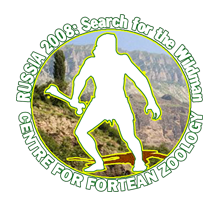We have asked all the expedition members to write a short piece on theirmotivation for joining the trip:
"Of all the possible subjects of cryptozoological inquiry, I believe that the search for hominids is the most important. The orang-pendek of Sumatra that the CFZ searched for in 2003 and 2004 may represent an ape that has taken one of the fundamental steps in human evolution, the ability to walk upright; the almas could be a snapshot of human evolution itself. Palaeo-anthropology at present is only barely an experimental science. The gulf that separates us from the earliest australopithecines is spanned only by a few bones and simple tools, widely scattered in space and time. Many of the questions that we have about human evolution can never be answered on the basis of fossils alone. This is why it is of the highest importance to look for any possible pre-human survivors.
You might naively expect that scientists would be clamouring to investigate any reports that suggest surviving hominids. Certainly there are plenty of them: there is not a mountain range in Asia that does not have local stories about large bipedal creatures. Unfortunately, too many scientists prefer to take the safe route, as though it is more important to dispute the precise interpretation of a cranial measurement on a fossil skull than to find the creature itself. Any researcher who suggested actual field work to loook for pre-human survivors would risk losing their research grant, which is all too often awarded by a committee of elderly academics who have no wish to see their life work rendered irrelevant by a dramatically new approach. Curiously, the physical sciences never seem to suffer from this: physicists get a billion dollars to search for the Higgs boson, or astronomers for black holes, without anybody deriding them on the basis that these things exist only in the realms of mathematical speculation. More often than not, their courage is rewarded. In cryptozoology we have one of the few ways in which the amateur can still make worthwhile scientific discoveries; in the field of human evolution it may even be the only way".
Chris has accompanied Richard Freeman on every on of his CFZ expeditions since 2003.
Sunday, 8 June 2008
Dr Chris Clark writes:
Labels:
almas,
almasty,
ape men,
apeman,
Bryan Sykes,
cfz,
cryptozoology,
expedition,
karbadino balkaria,
neanderthal survival,
richard freeman,
russia,
wild men,
wildman
Subscribe to:
Post Comments (Atom)


No comments:
Post a Comment